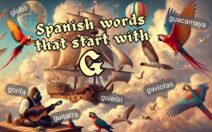Making plans with friends in Spanish: A practical guide

Get our free email course, Shortcut to Conversational.
Have conversations faster, understand people when they speak fast, and other tested tips to learn faster.
More infoImagine you bump into a Spanish-speaking friend you haven’t seen for a long time. What do you say to them? How do you go about making plans with friends in Spanish?
Small talk is an important skill in any language, and making plans is an important part of facilitating future conversations and encounters.
In this post we’ll go through some small talk scenarios, each showcasing a few useful phrases, so you can learn what to say the next time you bump into someone and want to make plans.
To build on the phrases we introduce here, we’ll end our post with a bunch of useful links to specific BaseLang posts that go into more detail on different angles to chatting with friends in Spanish.
Let’s get started!
Scenario #1: María and Isa
Here’s some context: two friends run into each other in the street after not seeing one another for several months. This first scenario has a very cool BaseLang video recreating the scene to better illustrate it. Pay attention to the phrases in bold because they are key when making small talk and plans with your friends.
María: ¡Hola, Isa! ¡Tiempo sin verte! – Hi, Isa! Long time no see!
Isa: ¿Qué tal, María? No nos veíamos desde hace varios meses. ¿Cómo va todo? – How are you, María? We haven’t seen each other for several months. How’s everything going?
María: Todo muy bien, lo mismo de siempre. ¿Y tú? – Everything’s fine, same as always. And you?
Isa: También. Aunque sí cambié de trabajo y estoy muy contenta. – Same. Although I did change jobs and I’m very happy.
María: ¡Qué genial! Me alegra mucho. Y cuéntame, ¿en qué estás trabajando? – That’s great! I’m very glad. Tell me about your new job.
Isa: Me encantaría, pero voy de afán en este momento. ¿Qué te parece si vamos a tomar un café un día de estos y hablamos? – I’d love to, but I’m in a rush at the moment. What do you say we go for a cup of coffee one of these days and chat?
María: Claro que sí. ¿Cuándo puedes? – Sure. When are you free?
Isa: Estoy libre este fin de semana, ¿y tú? – I’m free this weekend, how about you?
María: El sábado estoy ocupada, pero podría el domingo por la mañana. – Saturday I’m busy, but I could do Sunday morning.
Isa: Perfecto. Podríamos ir al nuevo café que abrieron cerca al parque. – Perfect. We could go to the new café that opened near the park.
María: Sí, hace días lo he querido probar. ¿Quedamos entonces para el domingo a las 9 am? – Yes, I’ve been wanting to try it for days. So, let’s meet on Sunday at 9am?
Isa: Perfecto, ahí estaré. ¡Me tengo que ir, pero nos vemos pronto! – Perfect. I’ll be there. I have to go, but I’ll see you soon!
María: Que te vaya bien. Hasta pronto, Isa. – All the best. See you soon, Isa.
Key phrases
This scenario offers us many useful phrases for small talk. First we say hello, we catch up a little, and we offer our excuses if we’re in a hurry. Finally, we move on to making plans with friends in Spanish, and then saying farewell. Let’s review the key phrases:
- ¡Tiempo sin verte! – Long time no see!
- ¿Qué tal? ¿Cómo va todo? – How are you? How’s everything going?
- Todo muy bien, lo mismo de siempre. – Everything’s fine, same as always.
- ¡Qué genial! Me alegra mucho. – That’s great! I’m very glad.
- Voy de afán en este momento. – I’m in a rush at the moment.
- ¿Qué te parece si vamos a tomar un café un día de estos y hablamos? – What do you say we go for a cup of coffee one of these days and chat?
- ¿Cuándo puedes? – When are you free?
- ¿Quedamos entonces… – So, let’s meet…
- Que te vaya bien. Hasta pronto. – All the best. See you soon
Scenario #2: Luis and Juan
Similar to the first scenario, two friends meet on vacation and decide to do something together. In this scenario we will see other types of useful phrases, such as compliments and suggestions. Pay attention to the words in bold to familiarize yourself with these phrases.
Luis: ¡Hola, Juan! ¡Qué gusto verte! – Hi, Juan! It’s so nice to see you!
Juan: ¿Qué más, Luis? Te ves muy bien. Me gusta mucho tu camiseta. – What’s up, Luis? You look so good. I really like your T-shirt.
Luis: ¡Gracias! Tú también luces increíble. ¿Cómo estás pasando el verano?- Thank you! You look amazing too. How are you spending your summer?
Juan: Muy bien. Estoy de vacaciones y he descansado bastante, ¿y tú? – Very well, I’m on vacation and I’ve rested a lot, and you?
Luis: ¡Qué bien! Yo igual. Mira, ya que estamos de vacaciones, deberíamos hacer algo divertido. – How nice! Me too. Look, since we’re on vacation, we should do something fun.
Juan: ¡Estoy de acuerdo! ¿Qué opinas de ir a la playa mañana? Podríamos invitar a nuestros otros amigos y hacer una fogata. – I agree! What do you think about going to the beach tomorrow? We could invite our other friends and have a bonfire.
Luis: ¡Eso suena genial! Me encanta la idea. Yo me encargo de las cosas para la fogata. – That sounds great! I love the idea. I’ll take care of the stuff for the bonfire.
Juan: Muy bien. Yo me pondré de acuerdo con los chicos para que todos llevemos algo para compartir. ¿A qué hora nos vemos? – All right, I’ll make arrangements with the guys so we all bring something to share. What time are we meeting?
Luis: Creo que a eso de las 8:30 am estaría bien. Puedo pedirle a papá la camioneta prestada para que estemos cómodos. – I think around 8:30 am would be fine. I can borrow dad’s truck, so we can be comfortable.
Juan: A esa hora está perfecto. Yo le avisaré a los chicos para que estén listos. – That time is perfect. I’ll let the guys know, so they’ll be ready.
Luis: De acuerdo, quedamos así, entonces. Paso por ustedes a eso de las 8:30am. – All right, it’s settled, then. I’ll pick you guys up around 8:30.
Juan: ¡Vale! ¡Hasta mañana! – Okay, see you tomorrow!
Key phrases
In this dialogue between Juan and Luis, we saw a lot of useful phrases for making plans with friends in Spanish. Let’s just review the key phrases here so you can use them in your own conversations:
- ¡Qué gusto verte! – It’s so nice to see you!
- ¿Qué más? Te ves muy bien. – What’s up? You look so good.
- Tú también luces increíble. – You look amazing too.
- Deberíamos hacer algo divertido. – We should do something fun.
- ¿Qué opinas de ir a la playa mañana? – What do you think about going to the beach tomorrow?
- ¡Eso suena genial! Me encanta la idea. – That sounds great! I love the idea.
- ¿A qué hora nos vemos? – What time are we meeting?
- Creo que a eso de las … estaría bien. – I think around … would be fine.
- A esa hora está perfecto. – That time is perfect.
- De acuerdo, quedamos así, entonces. – All right, it’s settled, then.
- ¡Vale! ¡Hasta mañana! – Okay, see you tomorrow!
Scenario #3: Lola and Rebeca
In the previous scenarios we covered some situations for making plans with friends in Spanish, including proposing and accepting invitations. But what about when you can’t go, or you’re unsure if you’ll be able to make it? In this conversation we present you some useful phrases for when you can’t make it, plus a few additional small talk expressions.
Lola: ¿Rebeca? ¡Qué sorpresa! ¿Qué te trae por aquí? – Rebeca? What a surprise! What brings you around here?
Rebeca: ¡Lola! ¡Qué grata coincidencia! No esperaba encontrarme contigo en España. Vine por trabajo, ¿y tú? – Lola! What a nice coincidence! I didn’t expect to meet you in Spain. I’m here for work, and you?
Lola: ¡Qué chévere! ¿Y en qué estás trabajando? Yo vine a visitar a mi hermano. Su cumpleaños es el jueves y quise sorprenderlo. ¡Deberías venir! – How cool! And what are you working on? I came to visit my brother. His birthday is Thursday and I wanted to surprise him. You should come!
Rebeca: Vine a promocionar mi nueva línea de ropa. Y gracias por la invitación, pero mi agenda está muy ocupada y no sé si podré. ¿Qué planes tienen? – I’m here to promote my new clothing line. And, thanks for inviting me, but my schedule is very busy and I don’t know if I can make it. What are your plans?
Lola: En la mañana, iremos a desayunar con unos amigos, y luego en la tarde celebraremos con unos cócteles en su casa. – In the morning, we’ll have breakfast with some friends, and then in the afternoon we’ll celebrate with cocktails at his house.
Rebeca: Quizá pueda acompañarlos al desayuno. ¿Me das tu número? Yo te aviso si puedo sacar algo de tiempo. – Maybe I can join you for breakfast. Can I have your number? I’ll let you know if I can make some time.
Lola: ¡Sí, claro! Anótalo. Es +34.999.888. ¿Y el tuyo? – Yes, of course! Write it down. It’s +34.999.888. What’s yours?
Rebeca: Es +34.777.666. Te aviso el miércoles en la noche, ¿está bien? – It’s +34.777.666. I’ll let you know Wednesday night, okay?
Lola: Sí, no hay problema. Espero que puedas ir, pero si no, no te preocupes, entendemos. – Yes, no problem. I hope you can make it, but if not, don’t worry, we understand.
Rebeca: Muchas gracias. Espero verlos el jueves. ¡Un gusto encontrarte aquí, Lola! – Thank you very much. Hope to see you on Thursday. It was nice to bump into you here, Lola!
Lola: ¡Igual! ¡Éxitos con tu trabajo, Rebeca! – Likewise! I wish you success with your work, Rebeca!
Rebeca: ¡Gracias! Saluda a tu hermano de mi parte. – Thank you! Say hello to your brother for me.
Key phrases
As we did for the previous situations, let’s just review some of the key phrases we saw here. A few are good for small talk when we run into someone, while the others are specific for when we’re not sure we can make it:
- ¡Qué sorpresa! – What a surprise!
- ¡Qué grata coincidencia! – What a nice coincidence!
- ¿Qué te trae por aquí? – What brings you around here?
- Vine por trabajo. – I’m here for work.
- ¿Qué planes tienen? – What are your plans?
- Gracias por la invitación, pero mi agenda está muy ocupada y no sé si podré. – Thanks for inviting me, but my schedule is very busy and I don’t know if I can make it.
- Yo te aviso si puedo sacar algo de tiempo. – I’ll let you know if I can make some time.
- Espero que puedas ir, pero si no, no te preocupes, entendemos. – I hope you can make it, but if not, don’t worry, we understand.
- ¿Me das tu número? Anótalo. – Can I have your number? Write it down.
- ¡Un gusto encontrarte aquí! – It was nice to bump into you here!
- Saluda a tu hermano de mi parte. – Say hello to your brother for me.
Conclusion
So, what did you think of these dialogues? Did you get some good ideas for Spanish small talk? Do you feel better prepared for making plans with friends in Spanish?
Today we saw three different scenarios filled with useful phrases that you can integrate into your own conversations. They all started with greetings followed by some small talk, and then they showcased some options for making and accepting invitations, as well as declining them. We also saw some ways to give compliments and good wishes.
We hope you enjoyed this post and that you can put some of these expressions into practice whenever you’re making plans with friends in Spanish! To give you even more options, we’ll end our post with a bunch of other useful references to build on what we’ve seen here.
Recommended reading
When you first run into someone, you’ll want to know a bunch of Spanish greetings and goodbyes, or you can choose between 10 different ways to say “how are you?” in Spanish. For specifics on asking how someone is doing, you’ll want to know all the intricacies of using qué tal vs cómo estás.
Once you get chatting, you’ll find our intro to Spanish small talk to be a good resource. Maybe you’ll want to talk about your family in Spanish, or perhaps you’ll want to share your emotions and feelings. If you want some polite responses that it’s going ok but it could be better, you might want some options to just say “it is what it is” in Spanish.
To tell someone how good they look or how well they do something, you’ll want to learn the most common compliments in Spanish. And if you’re interested in a little more when you reconnect with your acquaintance, you’ll want to refer to our guide to flirting in Spanish!
Once you’re making plans for specific days, you’ll need to know how to refer to dates in Spanish, as well as vocab for the days, months, and seasons in Spanish. And finally, when it comes to meeting, you’ll want to be clear on when to use encontrar vs encontrarse.



